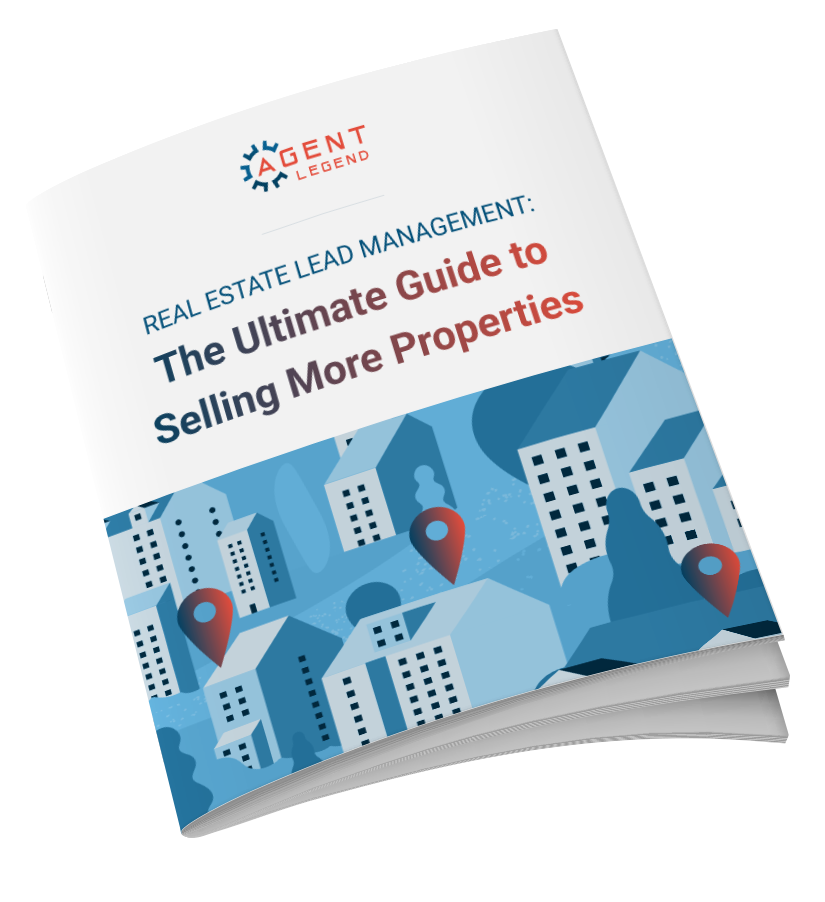Introduction
Real estate lead management can be a bit tricky, but we’re here to lend a hand. At Agent Legend, we prioritize giving maximum value to our users. We understand that you want to move more properties. With every sale, you and/or your company can earn more commissions.
Put another way, leads that aren’t nurtured can go cold. When that happens - properties don’t move. The result? Unhappy agents and potential buyers and sellers. With that in mind, we’ve put together an ultimate guide to selling more properties.
In this guide, we’ll be covering:
- The Essential Steps For Real Estate Lead Management Success
- Winning Strategies for Effective Real Estate Lead Management
- A Definitive Guide to Real Estate Lead Qualification, With a Checklist
- How to Route Leads to the Right Agents
- Lead Conversion Tips for Real Estate Agents to Get More Sales
- An Overview of Real Estate Emails You Should Be Sending to Your Leads, and
- Advantages of Using Lead Management Software
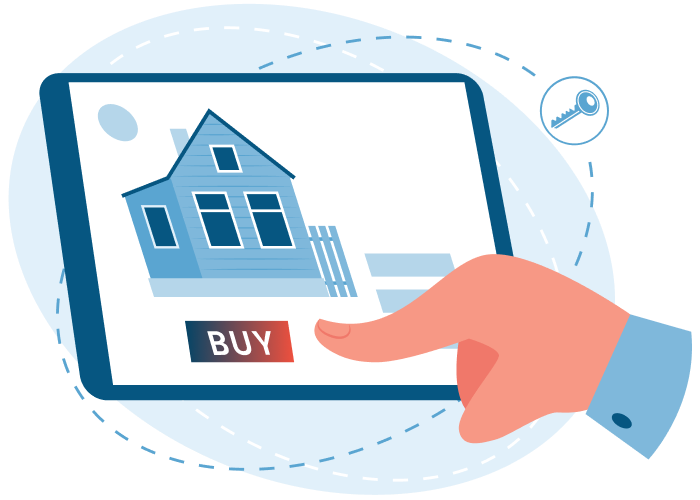
CHAPTER 1
7 Essential Steps For Real Estate Lead Management Success

Every real estate team can benefit from lead management that’s simple, quick, and effective. Are you ready to make your real estate lead management a powerful tool for success? From start to finish, here are the 7 essential real estate lead management steps for success:
1. Capture Inbound Leads
Inbound leads are all the people that initiate contact with your business first. Frequently link to/share surveys and utilize forms (e.g. a “Contact Us” form) to capture identifying information like names and phone numbers. You can share them on your website, in your blog posts, on social media etc… Then, take all of that important data and store the information in your favorite CRM software for easy access by the whole team.
2. Categorize Your Leads
To better target or match leads with the right agent, separate leads based on information like age, region, industry, language, and perceived value. This will ensure that the leads are handled in the most efficient manner possible.
3. Pair Leads With The Right Agents
Everyone has their strengths and weaknesses. Assign your categorized lead groups to the most appropriate agent, and let their talent shine. You may choose to distribute groups to agents based on experience-level, region expertise, cultural background, etc...

4. Update Lead Information
More information will unfold as interactions begin. Frequently update lead information on a CRM or other service. With updated lead information, you have more opportunities to engage effectively. Even leads that feel like dead-ends can become great opportunities with updated information.
5. Qualify Leads
This step is another form of categorization, but this time, you’ll only be separating leads into two groups: qualified or unqualified. Qualified leads are seen as prospective leads that are likely to yield conversions at some point in the near future. Unqualified leads are leads that are likely to be dead-ends or ones that will take a significant time investment to convert.
6. Follow Up With Leads
Send follow up emails, calls, and/or texts to your qualified leads first. These are the leads that are the most likely to respond without unnecessary effort. If there’s extra time at the end of the day (i.e. If you’re waiting on new qualified leads to populate), you may choose to follow up with unqualified leads too.
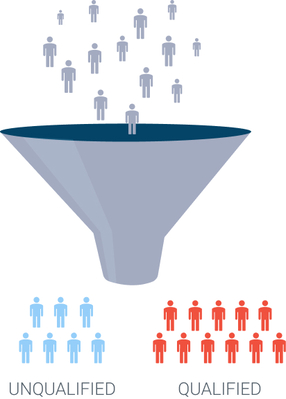
7. Lead Conversion
Lead conversion is the final step. While it’s not always the easiest step to reach, when the lead turns from a prospective client to an actual client, you’ve successfully made a sale and/or secured a listing. Drive it home and enjoy the win!
Chapter 2
6 Winning Strategies for Effective Real Estate Lead Management

The real estate market is worth trillions of dollars, and it may sometimes feel like a competitor’s lurking around every corner. Fear not! In this chapter, we’ll cover six winning strategies for effective lead management.
1. Centralize Your Leads
Whether through word-of-mouth or your website - leads tend to be scattered everywhere. Centralize your leads in a single place that’s secure and easily accessible. If needed, you can start with a simple electronic spreadsheet, but as you get more information, consider upgrading to a CRM like Agent Legend.
2. Establish Lead Management Systems
Everything's better with a plan. Establish lead management systems by creating a series of steps that guide leads towards converting. To make the most out of your system, define your buyer persona and business goals beforehand.
3. Personalized Automation Is Powerful
Nothing beats automation combined with a personalized touch. Agents no longer need to pick between convenience and forming lead relationships. Use a real estate follow up automation software such as Agent Legend that allows you to seamlessly incorporate your brand voice and tone without spending hours connecting with leads one on one.
4. Automate Lead List Updates
People are being added or dropped from lead lists at any given moment. But, you don’t actually need to dedicate one of your valuable team members to manually update lead lists anymore. Improve accuracy and avoid wasting time by adopting automated lead list updates with the right software.
5. Monitor Agents and Their Lead Follow Up
Review real estate follow up systems and see when, where, and how agents are interacting with and prospective clients. Monitoring can also help your team retrieve leads that are accidentally lost/missed. Check-ins like this may uncover bottlenecks in your follow up process as well.
6. Tap Into Past Clients
Previous clients as well as leads that weren’t ready to move forward with buying and selling can make up a large portion of your lead demographic. Don’t neglect them, and you’ll see more conversion opportunities. That’s why updating lead information is essential - it helps you tap into the right groups, and reach out when appropriate. You never know who could yield a new lead opportunity.
chapter 3
A Definitive Guide to Real Estate Lead Qualification, With a Checklist

Odds are as a real estate agent you’ve heard the phrase “lead qualification” at least a few times. It’s high time we get into the nitty-gritty of what real estate lead qualification actually is. In this chapter we’ll also share some expert tips and a valuable checklist that can help you qualify leads much more efficiently. We cover this more in depth in our blog post on the subject, but below is the gist of what you really need to know:
What Is Lead Qualification?
Lead qualification is essentially the process of gathering information on your leads/prospects, and then evaluating whether each one is fit for conversion or not. Again, leads that show promise of converting are considered qualified.
By making the distinction between qualified and unqualified leads, your team can more effectively pursue promising leads while avoiding repeated dead-ends. That said, here are four expert tips for making quick work of real estate lead qualification:
1. Automated Lead Qualification Is the Future
With an automated system in place, your team saves time on lead qualification, and your leads get the benefit of being responded to faster. Of course, automated lead qualification does depend on you asking the right questions, and establishing the best touch points for accuracy purposes.
2. Make an Ideal Customer Persona
Create an ideal customer persona first. Don’t skimp on this step! Why? If you don’t understand your customers, how will you attract more of them?
When creating your ideal customer profile, you may choose to use a template (like this HubSpot one) or just create a list of what traits your ideal customer has. Whatever method you choose, just make sure your ideal customer persona is as specific as possible. This will also make it easier to write sales copy, and other lead generation materials.

3. Utilize A Lead Scoring System
Assess your leads through a scoring system, ideally with software, that allows for an unbiased quantitative approach. This way, once a lead exceeds a designated threshold, you’ll be automatically alerted that the lead is ready to proceed. Furthermore, you’ll know which leads are “the hottest” and be able to prioritize working with them first.
4. Persistence is Key
Don’t give up too early, and don’t count out the leads you may believe to be “dead-ends” just yet. If you see a common denominator for leads that aren’t converting, there may be possibilities to re-engage for better conversion rates. Of course, persistence doesn’t mean being spammy or overly pushy. Be respectful of leads and their requests.
BANT - The Lead Qualification Checklist
To help you qualify your leads even faster, here’s a checklist that may help. It’s called the BANT checklist, and it stands for Budget, Authority, Needs, and Timing. This lead qualification checklist covers all your bases. Let’s break each of them down.
Budget
The most critical question you need an answer to here is, “Can the lead afford the property?”
The reason this question is so important is if your lead can’t afford the property, you’ll probably be wasting your time and effort as well as that of your lead.
Pro Tip: Include a budget question on all lead generation forms/surveys.
Authority
Questions to ask:
- When was the last time the lead bought/sold property?
- Is there anyone else who should be here to make choices?
- What does the decision-making process look like?
Does the lead have buying authority in the business? Ideally, you want your main point of contact to be the primary decision-maker. If that’s not possible, try to at least include them in the conversation. This reduces last minute cancellations and back-and-forth communication delays, ultimately saving everyone time and energy.
Needs
Questions to ask:
- What’s holding your buyers/sellers back?
- Is it location, budget, some other issue?
- How are you tackling these issues?
- Can you provide additional properties for the consideration?
- Can you partner/work with lenders to get better mortgage rates on behalf of your clients?
- What roadblocks, if any, do you anticipate in the future?
- i.e. Potential withdrawing of their offer, looking for another agent, requesting lower commissions, etc...
What are your lead’s needs? By understanding your lead’s pain points and the solutions they would like, you have a better idea as to where your offerings stack up. If you don’t believe your services match their needs, you may be wasting time in pursuing them.
Timing
- Is the need for property sales/purchases timely? Put another way, how urgent is your lead to make a sale and/or purchase?
- New jobs/job loss, imminent foreclosure, and other factors can cause a lead to want to sell/buy quickly
- Is the market hot/cold right now?
- For example, in the midst of the COVID-19 pandemic property prices began to escalate dramatically. However, in 2022, these prices could level out or even drop just as drastically as they escalated.
- Are you considering other factors that could impact your lead’s time frame?
- i.e. Grade school start dates, timely events such as SuperBowl/Olympics/Political Conventions, holidays, etc...
Is now the right time for your lead? Some leads act in days, while others take years to finally convert. It is important to prioritize leads with small timeframes, and backtrack to leads with bigger timeframes in the future.
chapter 4
Real Estate Lead Assignment: How to Route Leads to the Right Agents
In this chapter, we’re exploring the idea that even cold leads can warm up. There just needs to be a strong and cohesive relationship between them and the right agent. The question is - how do you route leads to the ideal agent? In this post, we’ll give you several examples for lead routing, and the pros and cons of each.
1. Time To Act Lead Assignment
Speed is of the essence for this first tactic. Assign initial leads to agents that are speedy and highly productive. Once a lead shows promise, you may choose to route them to your most experienced agent(s).
Pros
- Short response time means more access to lead information
- Higher lead satisfaction can lead to better conversions
Cons
- Less personalization between lead and agent
- Burnt out and/or fatigued agents
2. Lead-Agent Suitability Approach
Forming the strongest relationship is the name of the game for this lead routing approach. Leads are given to agents based on a variety of factors including language, region, size of prospective deal, and industry.
Pros
- Agent expertise for catering to each lead
- Establish better relationships with leads
- Experience for agents who specialize in individual lead niches
Cons
- Unbalanced number of leads for each agent
- Unfair differences in lead quality (e.g. some regions wealthier than others)
- Limited flexibility for agents
3. Lead Assignment Based On Availability
Like the name suggests, this approach is all about availability. Agents will work collectively to respond to new leads from a general lead pool. The longer a lead is waiting, the more urgent it is for somebody to respond to them as soon as someone is available.
Pros
- Productive agents are rewarded
- Every lead is answered before going cold
Cons
- Lead hoarding
- Quantity-over-quality approaches resulting in lead dissatisfaction
4. Round Robin
Round Robin works by assigning leads on a rotational basis until all leads have been evenly distributed. Every agent will get a random, but equally sized piece of the cake.
Pros
- Fairest approach
- Equal workload for all agents
- New agents will gain quick experience working with a variety of leads
Cons
- Less likely to meet lead needs
- Reduced lead satisfaction
- Eliminates healthy competition and incentives for agents
5. Top Performer Distribution
Top agents are offered the most leads, and the lowest agents are offered the least. As you descend down the rank hierarchy, you’ll receive less and less leads.
Pros
- Incentive to work hard
- Creates a competitive environment
Cons
- Creates a competitive environment (this is mentioned twice because competition can sometimes be good, sometimes bad)
- Lower team morale
- Overwhelmed top agents leading in efficiency
- Little room for improvement or experience
To learn more about these routing options, read our blog post Real Estate Lead Assignment: How to Route Leads to the Right Agents.
Chapter 5
Lead Conversion Tips for Real Estate Agents to Get More Sales

Hundreds if not thousands of real estate companies may be competing for the same pool of leads. That’s why in this chapter, we’re giving you our five best tips for improving lead conversion rates to get more sales.
We wrote a longer blog post on the subject here, but below are the highlights.
1. Plan Ahead to Make Contact Immediate
71% of online leads go cold if agents don’t respond fast enough. Today’s consumer culture won’t allow for even a second of delay, making immediate contact with leads vital. Plan to have an agent on standby and/or utilize automated lead contact tools like Agent Legend for instant outreach.
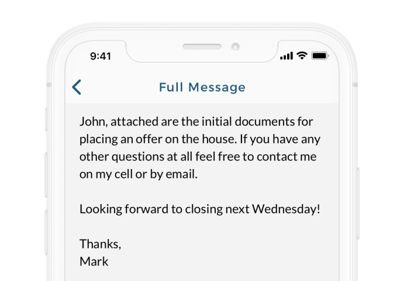
2. Capture and Maintain Lead Interest
After the initial contact, the next 10 days will require lots of engagement. As time goes by, lead interest will naturally decrease. It is because of this that an agent calls, text, or leaves a voicemail whenever your team has time. This is an aggressive and high touchpoint process that works to increase visibility.
If you don’t have time or an agent to spare, lead nurturing software becomes that much more critical!
3. Don’t Underestimate the Power of Free Valuable Content
Content reigns supreme when nurturing leads. This is especially true when the content is helpful and valuable to your consumers. Offering content that is helpful and accurate to your audience such as where the best schools are, crime rates in the area, local attractions, etc… and your team will cement itself as an industry thought leader.

4. Design and Execute Drip Campaigns
Drip campaigns involve sending your leads important reminders and valuable content “drop by drop”. Emails are sent to inspire and keep your leads interested in your services. They also serve as reminders and safety nets in case leads have missed previous emails/texts/other correspondence.
Pro Tip: Find a balance between promotions and providing real value when designing your drip campaigns.
5. Inbound Lead Nurturing Based On Lead Type
Relationships matter, and that’s why a single lead nurturing strategy on its own is doomed to fail. Devise a short term nurture strategy for A-leads, a mid-term nurture strategy for B-leads, and a long-term nurture strategy for C-leads. Remember there is power in personalization when it comes to converting leads.
chapter 6
5 Real Estate Emails You Should Be Sending to Your Leads

While some industries may believe that email is dead, savvy real estate agents know that the art of emailing leads in hopes of converting them into customers is far from over. In fact, email as a means of connection and conversion is still thriving.
That said, in this chapter, we’re sharing examples of real estate emails you should be sending to your leads.
1. Personal Welcome Emails
Life gets busy. There’s rarely any time to write personal welcome emails for every new lead that joins a lead list. The good news is, you can still reach out in a personal way. The solution is having the right email template that makes it seem like you have all the time in the world. Focus on creating a template that sounds natural and feels authentic. Do this, and leads will think you wrote the welcome email just for them.
Sample email copy:
Hi [First Name],
This is Tammy with Tam’s Real Estate, and I just saw that you filled out a form on my website. First off, just a big thank you for being interested in what we do. I just wanted to send over a quick hello, and to let you know that I’m always here if you have any questions. Let me know if you want to set up a live session. Talk soon!
Stay well,
Tammy Tamster
Tam’s Real Estate
Pro Tip: Don’t forget to add a few links to commonly visited pages on your website (e.g. a FAQ section).
2. Nudge Emails
Nudge emails are great for following up with leads that haven’t responded to previous emails. Maybe they're ignoring your emails intentionally, but it’s more likely that they just missed it. These emails are usually sent by themselves or in sets of two that are sent a few days apart. Again, keep the tone conversational and personal as if talking to them in real life.
Sample email copy:
Hey again, [First Name],
This is Tammy with Tam’s Real Estate. I know this time of year can be hectic for many people. Just sending a friendly follow-up in case you missed my last email. I would appreciate it if you could take a look at that last email and get back to me. Reach out at (123) 456-LEAD, or email me at Tammy@TRealEstate.com. I’ll try to get back to you on the same day.
Talk soon,
Tammy Tamster
Tam’s Real Estate
3. “Do You Need Help?” Emails
Easy and simple, just send an email asking leads if they need any help. Generic emails can be templated, but unique situations might require new writing. For instance, if you’re in the process of helping somebody already, you would send a personalized email separate from the template. Take a look at the sample copies.
Sample email copy:
Specialized
Hey [First Name],
This is Tammy with Tam’s Real Estate again. Were you able to login to your account and get in touch with the home staging company? Please let me know if you’re still experiencing the same problems. I can contact them on your behalf and relay a message if that’s something you want. Let me know if I can be of help.
Thank you,
Tammy Tamster
Tam’s Real Estate
Sample email copy:
Generic
Hey [First Name],
This is Tammy with Tam’s Real Estate. Just sending a friendly reminder that I’m here if you ever need help or have any questions. My door is always open and there are no stupid questions here. Talk soon and have a great day!
Best regards,
Tammy Tamster
Tam’s Real Estate

4. Valuable Follow Ups
Again, value is everything when trying to keep a lead on the line. Instead of being salesy, take some time to update your leads on statistics, expert advice, and industry news. In the world of business, value leads to reciprocated value.
Sample email copy:
Hey there, [First Name],
This is Tammy with Tam’s Real Estate. Wanted to send a quick reminder that rental prices are skyrocketing all over our region. Buyers are paying nearly 200% over 2018 market prices right now. This could be a great opportunity to purchase a rental and lease it. If you think this is for you, don’t miss out!
All the best,
Tammy Tamster
Tam’s Real Estate
5. Feedback Request Emails
Feedback request emails work two-fold. Your team will get to know what you are doing great and what can be improved. Your leads are able to vent and let out their frustrations (if they have any), and will appreciate the opportunity to be heard.
Sample email copy:
Hi [First Name],
This is Tammy with Tam’s Real Estate, and I had the pleasure of working with you recently. I would appreciate it if you could take a few minutes to fill out this quick survey about your experience with our company. Fill out our survey and you’ll have the opportunity to win a $50 Amazon gift card! Thanks for your time, and we greatly appreciate your feedback.
Best,
Tammy Tamster
Tam’s Real Estate
Pro Tip: A small incentive will drive more people to voice their opinions. The valuable information that comes from feedback surveys is well worth spending a bit of money.
Chapter 7
6 Advantages of Using A Great Lead Management Software

In this final chapter, we’re sharing the six advantages of using lead management software. Believe it or not, when you use software like Agent Legend, you and your company can enjoy higher conversion rates, and close more sales. Here’s what Agent Legend can do for you:
1. Immediate Contact With Your Leads
Keep your leads as hot as possible with immediate contact. Agent Legend allows you to reach out to new leads without making you take time out of your day. Set up your account and fill out some automated templates, and you’ll immediately weed out non-responders giving you extra time to focus only on serious leads. After all, leads that have a chance of actually converting are the most important ones in your business and connecting with them quickly can be the difference between earning a listing/sale or losing them to your top competitor.
2. You Don’t Have to Be a Tech Genius to Use Our Software
Agent Legend offers intuitive and clean dashboards that take mere moments to become familiar with. Even the least tech-savvy individual can understand how to use our software. If that wasn’t enough, we produce data and reports on your behalf, transforming them into easily digestible tables and graphs. Why waste time deciphering code, when you have leads to nurture?
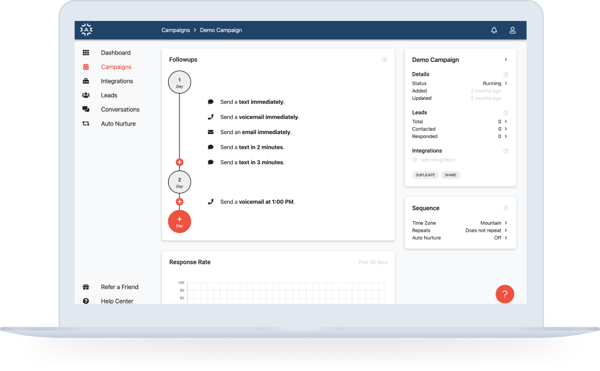
3. A Beautiful Combination of Automation and Personality
Automation and personality are important for any business. Why choose between one or the other when you can have both? Agent Legend equips you with a robust set of tools to create automated call, text, and voicemail drip campaigns that still mimic your brand voice and personality with ease. Connect with leads and schedule follow ups on your schedule without losing that personal touch clients expect. The best part is you put in the work once, and it practically runs on autopilot after that!
5. On The Go? Our App Can Go With You
Make your phone a competent digital assistant with our Agent Legend app for Android or iOS. Even on the go, you can connect with leads and view important lead information at the press of a button.
6. Experience Unparalleled Support
When using Agent Legend lead management software, you get linked to a customer success team and library of resources. From the initial onboarding to campaign optimization, our team is ready to assist and make you succeed.
We want you and your team to make more sales and book more listings in the coming days. That’s why for a limited time, you can start using our program for FREE! You heard us right, try Agent Legend for free. No strings attached!
Elevate your real estate processes to a legendary level by combining ease, automation, and personality. Ready to become a legend yourself? We’re betting that once you try us, you’ll wonder how you ever managed your leads without us! Click here, and take the first commitment-free step towards becoming a legend in real estate.
Table of Contents
- Introduction
- 1. 7 Essential Steps For Real Estate Lead Management Success
- 2. 6 Winning Strategies for Effective Real Estate Lead Management
- 3. A Definitive Guide to Real Estate Lead Qualification, With a Checklist
- 4. Real Estate Lead Assignment: How to Route Leads to the Right Agents
- 5. Lead Conversion Tips for Real Estate Agents to Get More Sales
- 6. 5 Real Estate Emails You Should Be Sending to Your Leads
- 7. 6 Advantages of Using A Great Lead Management Software

